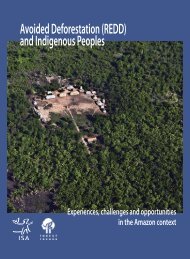BASELINE STUDY 5, Thailand - Forest Trends
BASELINE STUDY 5, Thailand - Forest Trends
BASELINE STUDY 5, Thailand - Forest Trends
You also want an ePaper? Increase the reach of your titles
YUMPU automatically turns print PDFs into web optimized ePapers that Google loves.
“Article 46 established community rights in natural resource management. Article 59 guaranteed individual<br />
rights to participate with the state and community in managing natural resources and the environment.<br />
Article 76 exhorted the state to support participation in shaping public policies and to be accountable<br />
to the public. And Articles 79, 290 and others called for the participation of local governments,<br />
associations and traditional communities in policy making” (Unger and Siriros 2011:211-212;<br />
see also Thawilwadee 2006).<br />
The 1997 Thai Constitution was superseded by the 2007 military-backed Constitution. As of yet, there has been<br />
no Public Consultation Law passed by the Thai senate. The current legal instrument that guides public consultation<br />
around environment and development issues is a 2005 Prime Ministers Order (Unger and Siriros<br />
2011:214). In practice, state agencies have dominated public consultations around the environment in <strong>Thailand</strong>,<br />
with civil society participating on an ad hoc basis, and with political parties playing only a minor role (ibid).<br />
A complex bureaucracy in <strong>Thailand</strong> has led to a situation in which different agencies and organizations hold<br />
overlapping jurisdictions, impeding the legibility and transparency of the Thai state. For instance, Floch and<br />
Blake (2011:30) argue that <strong>Thailand</strong>’s water management sector:<br />
“…has been marked by events of public deliberation that turned out as mere public announcement forums<br />
‘educate’ an ‘uninformed’ or ‘uneducated’ rural population about the merits of a particular investment.<br />
This is at odds with attempts to build what Novotny (1999) calls ‘socially robust knowledge’,<br />
or public participation that goes beyond state actors (and consultants engaged by them) defining both<br />
problems and solutions.”<br />
Environmental megaprojects proposed by the Thai government (such as the Khong-Chi-Mun inter-basin irrigation<br />
scheme for Northeast <strong>Thailand</strong>, proposed by the first Thaksin government in 2004) have been characterized<br />
by non-transparency and poor planning (Molle and Floch 2008). 9 In turn, Thai environmental civil society<br />
has been divided (including urban vs. rural divisions, rich vs. poor; and socio-environmental left vs. right). Some<br />
Thai environmental groups themselves have issues with democratic accountability, and are often focused on<br />
local and community-based initiatives that tend to limit their influence in national political affairs and within the<br />
realm of policy.<br />
However, participation in policy-making processes is improving as civil society becomes increasingly organized<br />
and state agencies have begun to include more stakeholder groups in substantive consultations. Grainger<br />
(2004) argues that interactions between the domestic Thai media and Thai environmental campaigners plays a<br />
crucial role in building environmental momentum around specific issues— international organizations are presented<br />
as playing a far more limited role. Yet, the failures to arrive at more effective policy solutions to environmental<br />
problems in <strong>Thailand</strong> likely stems from the absence of encompassing institutions able to broker<br />
compromises. Thai political parties do not play such a role often or effectively. In three environmental cases<br />
examined by Unger and Siriros (2011) [the Thai public consultation process, and the Thai community forestry<br />
and water management legislation], NGOs found it difficult to devise or to accept compromise outcomes, leading<br />
to policy bottlenecks on these issues. The Thai Experience with the Community <strong>Forest</strong>ry legislation, presented<br />
below and in Box 1, offers an opportunity to examine the role of public participation in the forestry sector.<br />
9 On the proposed K-C-M irrigation megaproject, Molle and Floch (2008:200) argue: “Despite the dramatic likely impact on<br />
populations, livelihoods, and the environment, in terms of benefits, costs, and externalities, no participatory mechanism<br />
was observed…”. Regarding previous water megaprojects in <strong>Thailand</strong>, the authors write: “public hearings were often not<br />
transparent and were a means to legitimize projects… public participation [were] selective, and EIAs [were] shoddily prepared<br />
or bypassed completely… The past stories around the Pak Mun and Rasi Salai Dams echo a traumatic experience of<br />
how the assessment of costs and benefits can be distorted, and of how attendees to public hearings can be selected. ”<br />
(ibid.)<br />
© EU FLEGT Facility, <strong>BASELINE</strong> <strong>STUDY</strong> 5, <strong>Thailand</strong>: Overview of <strong>Forest</strong> Law Enforcement, Governance and Trade, July 2011<br />
This Action is funded by the European Union and the governments of Finland, France, Germany, the Netherlands, Spain and the UK. The views expressed herein<br />
can in no way be taken to reflect the official opinion of the European Union.<br />
www.euflegt.efi.int<br />
14
















